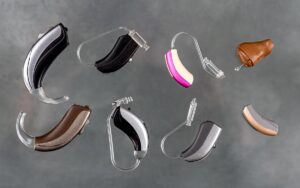The charm of the winter season is all about frosty cool air, getting cozy in your warm home, and cheerful holiday gatherings. However, the nippy months also bring distinctive challenges for your ears and hearing health. When it’s cold, protecting your hearing is crucial, whether you’re out in the bitter cold wind or dealing with the challenges of safeguarding your health from illness.
For people who depend on hearing aids, winter presents added concerns, but with a few proactive measures, you can protect your hearing and devices throughout the season.
The impact of winter on hearing and hearing aids
There are a few ways that your ears and hearing aids can be impacted by winter’s cold conditions. Understanding these risks can help you take the necessary measures to protect your hearing health.
Your risk of getting an ear infection increases
Winter weather frequently leads to ear infections as a result of temperature fluctuations and increased exposure to inside germs. When your ears are exposed to cold air, any moisture inside can quickly cool and create an environment favorable to infection. Additionally, spending more time inside heightens exposure to viruses and bacteria, increasing the risk of respiratory illnesses that can affect ear health.
Hearing aid risks when it’s cold
You’re more likely to encounter wet weather conditions in the winter which can expose your hearing aids to potentially detrimental moisture. Damage and malfunctions can be the consequence of rain, snow, and condensation from cold air. A hearing aid’s functionality and lifespan can be adversely affected if the sensitive electronics are jeopardized by moisture.
Dry air and ear canal discomfort
Winter air tends to be dry, both outdoors and indoors because of heating systems. This dryness can cause your skin, including the skin in your ear canal, to become irritated, flaky, or itchy, making ear discomfort more prevalent in the winter.
Guidelines to safeguard your hearing this winter
Fortunately, a few simple strategies can help decrease the impact of winter on your ears and hearing aids. Implementing these habits will keep you comfortable and your hearing devices functioning optimally.
Keep hearing aids dry and safe
Even in snowy or rainy conditions, it’s essential to wear your hearing aids every day to maintain auditory stimulation.
However, to protect them:
- Consider utilizing a protective cover or sleeve for your hearing aids to shield them from snow and wind.
- Utilize a dehumidifying storage container overnight to get rid of any moisture.
- Rapid temperature changes can cause condensation to build-up so avoid them whenever possible.
Continue to be active socially
Winter isolation can be tempting, but staying socially involved is vital for your hearing health. Your brain’s auditory processing will remain strong and active by engaging in conversation and attending social events. Hearing retention and cognitive function can even be maintained by watching a movie or having coffee with friends.
It’s necessary to practice good ear hygiene
Keeping clean and dry ears is crucial during winter.
The following are a few tips to help you accomplish that:
- The danger of injury is increased by the use of cotton swabs which can jam earwax further into your ear canal and should never be used.
- Gently dry your ears with a towel after being exposed to moisture.
- If needed, clean around the ear openings with a soft cloth and warm water.
Safeguard your ears by managing your winter sickness
During the winter you’re more prone to illnesses like the cold and flu so it’s essential to take some extra safety measures:
- Reinforce your immune system by preserving a healthy diet and staying well hydrated.
- Think about getting a flu vaccine and wearing a mask in crowded indoor spaces if necessary.
- Wash your hands frequently to reduce exposure to germs.
Consult us for personalized advice
Reach out to us for a consultation if you’ve noticed any issues with your hearing aids, ear discomfort, or frequent ear infections. We will get your hearing aids winter-ready, provide customized solutions, and assess any concerns you may have. Minor problems can be identified early before they escalate allowing you to be ready for the difficulties of the season.
Schedule an appointment for an evaluation today.
[blogcta]





